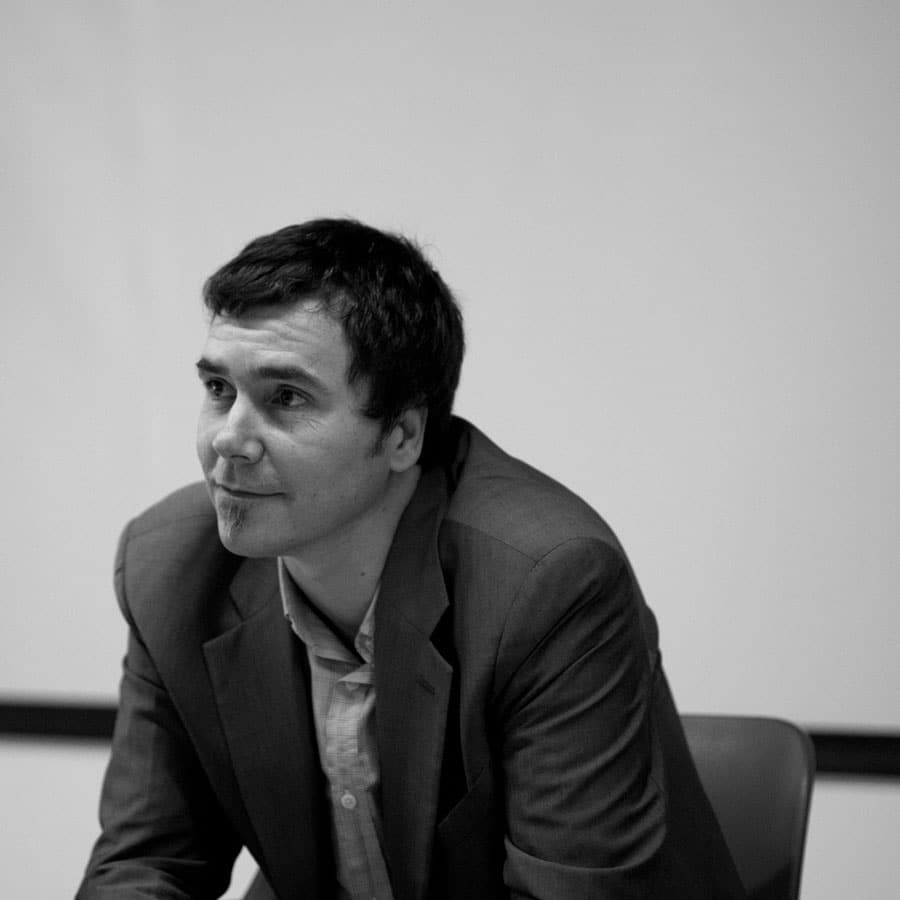Summary
The speaker opens by sharing a personal experience of being a cyclist, setting a tone of vulnerability. He explains that innovation, historically linked to radical change or insurrection, often triggers fear and resistance because it threatens individuals' sense of purpose, mastery, and autonomy, which are core intrinsic motivators. Using a government pilot program example combining courtroom and transport services, he illustrates how employees' uncertainty about job security fuels natural resistance, not stubbornness. The speaker emphasizes that people's ingrained ways of thinking create cognitive 'blinkers,' and overcoming these requires multidisciplinary teams and dissent to challenge narrow perspectives. He highlights the psychological difficulty of defending singular ideas and the value of generating multiple concepts to break down ego-attachment and foster collaboration. Citing an extreme archaeological example, he shows how bias and personal identity can obstruct acceptance of new ideas. He also notes the problem of change fatigue in organizations, stressing that empathy for customers ignites sustained energy and commitment to push ideas from concept to impact. The talk closes by referencing Harry and Marie, who will extend discussions on prioritization and organizational barriers to innovation.
Key Insights
-
•
Innovation disrupts individuals’ intrinsic motivations of autonomy, mastery, and purpose, often causing fear and resistance.
-
•
Organizational change can create prolonged job insecurity, leading to natural hesitation rather than stubbornness among employees.
-
•
Longstanding routines provide efficiency but also create cognitive blinders that limit innovative thinking.
-
•
Multidisciplinary teams and healthy disagreement are essential to break narrow problem frames and generate fresh ideas.
-
•
Generating multiple ideas reduces personal ego attachment to any one idea, promoting openness and collaboration.
-
•
Combining and synthesizing ideas collectively leads to stronger, shared innovation rather than defending individual concepts.
-
•
Personal biases and dislike of others can block good ideas; separating ego from idea is critical in teamwork.
-
•
Change fatigue emerges when employees face constant uncertainty and shifting demands without clear outcomes.
-
•
Empathy for customers fuels motivation to overcome organizational and political barriers to innovation implementation.
-
•
Ideas only create real change once they reach and benefit the end user, underscoring the importance of shipping solutions.
Notable Quotes
"When we think about innovation, it used to mean revolution or insurrection, which naturally makes people fearful."
"Innovation programs often come as directives, threatening people’s sense of control over their own work."
"People aren’t being stubborn or difficult when resisting change; they have mortgages to pay and need certainty."
"We all get cognitive blinkers, seeing the world narrowly shaped by our own experience and habits."
"If everyone in the room thinks alike, you end up with the same ideas. You need disagreement for fresh perspectives."
"When you have only one idea, you’ll defend it fiercely because it’s the only one you’ve got."
"It’s very difficult to separate our ego from our idea, but doing so allows better group collaboration."
"People shoot down ideas from colleagues they don’t like, confusing personality with the value of the idea."
"Change fatigue happens when you’re caught in a constantly shifting landscape without clear progress or security."
"We start to really care about the customer, and that care gives us the energy to push ideas through tough organizational barriers."
Or choose a question:















More Videos
"Concept validation lets us objectively decide which features to build based on perceived usefulness and intent to use."
Standardizing Product Merits for Leaders, Designers, and Everyone
June 15, 2018

"Most strategy today is guesswork based on what others are doing, not based on situational awareness."
Simon WardleyMaps and Topographical Intelligence (Videoconference)
January 31, 2019

"The Twitter algorithm favored lighter skin tones when cropping images, reflecting racial bias in tech."
Sandra CamachoCreating More Bias-Proof Designs
January 22, 2025

"I held Jeff accountable by expecting criticism to come with rationale and intentional improvement."
Darian DavisLessons from a Toxic Work Relationship
January 8, 2024

"Providing more holistic recommendations helped us gain more trust and buy-in from stakeholders, increasing UX maturity."
Fisayo Osilaja[Demo] The AI edge: From researcher to strategist
June 4, 2024

"Craft cultivates customer satisfaction, loyalty, and even forgiveness when functional issues arise."
Uday GajendarThe Wicked Craft of Enterprise UX
May 13, 2015

"Trust is often underestimated but is critical when designers face public critique and feedback."
Davis Neable Guy SegalHow to Drive a Design Project When you Don’t Have a Design Team
June 10, 2021

"We did a great cleanup of patterns from every decade and deleted anything off brand or untested."
Eniola OluwoleLessons From the DesignOps Journey of the World's Largest Travel Site
October 24, 2019

"We believe tracking design metrics aligned to business goals is important to demonstrate design’s impact."
Aurobinda Pradhan Shashank DeshpandeIntroduction to Collaborative DesignOps using Cubyts
September 9, 2022
















